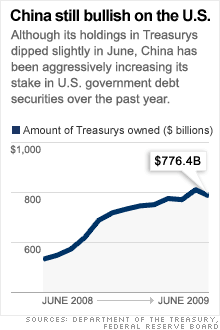Banks to get bailed out by China?
China's sovereign wealth fund may take part in plans to buy up toxic assets from banks. That could be a strong endorsement for the slow to develop PPIP.


NEW YORK (CNNMoney.com) -- Stocks plunged around the world Monday amid growing doubts about how strong a global economic recovery will be. But apparently there's a big contrarian investor out there that's still pretty bullish: China.
According to reports, China's sovereign wealth fund is eyeing an investment in the U.S. government's oft-maligned Public-Private Investment Plan.
That program, known as PPIP, was set up earlier this year as a way for private investors to cooperate with the government to bid for soured home loans and mortgage-backed securities held by banks. The China Investment Corporation (CIC) is said to be interested in purchasing $2 billion of such assets.
The possibility of China being involved in the PPIP could be a huge endorsement for the program, which has been criticized by many for taking a long time to actually start.
When PPIP was unveiled in March, influential bond fund manager Bill Gross of Pimco declared it a "win-win-win." But it has turned out to be more of a a "wait-wait-wait."
Pimco, which was widely expected to be named by the Treasury Department as one of the managers of PPIP, pulled its application to be a manager in June. The firm cited uncertainties about the program as its reason it was no longer interested. Treasury finally selected nine firms to manage PPIP in early July.
"PPIP has been a disappointment from a timing standpoint. It's a work in progress and the lack of momentum has been frustrating," said Frank Barkocy, director of research with Mendon Capital Advisors, a firm that invests primarily in financial stocks. "But given the might of China, it would be encouraging if we could get a player of that size and magnitude stepping to bid for some of these toxic assets. It would be a psychological plus."
If the CIC does actually decide to participate in PPIP, it could be viewed as yet another sign of confidence in the U.S. economy. China has continued to be a big investor in the United States throughout this painful downturn.
The Treasury Department reported Monday that China remained the largest foreign owner of U.S. Treasury securities, with $776.4 billion in holdings as of the end of June. While that's down a bit from the $801.5 billion China owned as of the end of May, it's still 45% higher than China's Treasury holdings a year ago.
Still, it's one thing to buy mostly safe U.S. Treasuries. It's another thing to start venturing into toxic mortgage assets.
Jim Glassman, senior economist with JPMorgan Chase, said that the possible involvement of China in PPIP, coupled with the fact that its holdings in Treasurys dipped a bit in June, could be a sign that China is even more bullish on the prospects of a bounceback than previously thought -- and that could have a big impact on other investors.
"If you believe in a global recovery, there are lots of other investments you could buy. But if China is interested in moving more into riskier assets, that could be a positive," Glassman said. "It is symbolizing renewed confidence. If more buyers are willing to take on risky assets, there could be a ripple effect."
That said, it's not clear if China would start a stampede of investor interest into PPIP if it does decide to participate.
For one, China has not officially declared that it is making any investments just yet. In addition, a $2 billion purchase is a drop in the bucket for a fund worth $200 billion. So it's not as if China appears set to load up on rotten mortgages.
It's also worth pointing out that this wouldn't be the first time that the CIC has waded into riskier investments -- and with little to show for it just yet.
China's sovereign wealth fund purchased stakes in private equity shop Blackstone (BX) and investment bank Morgan Stanley (MS, Fortune 500) in 2007. Both of those investments have been dogs so far.
Of course, these investments could eventually pan out for China if the CIC holds on to them for the long-term. Shares of Blackstone and Morgan Stanley have rebounded sharply from their lows earlier this year.
But even if they do continue to bounce back, it seems safe to say that China was guilty of being too quick to think that the global financial markets had bottomed out.
With all that in mind, it's premature to say that the worst really would be over for banks just because China is willing to dive into the toxic asset pool. The collapse of Colonial BancGroup (CNB) Friday and strong likelihood of a FDIC-brokered takeover of floundering Texas bank Guaranty Financial Group (GFG) are proof that many banks are still in trouble.
"China's potential involvement in PPIP isn't a panacea for banks. That would be putting the cart well before the horse," Barkocy said.
Talkback: Do you expect more big banks to fail or is the worst really over for the group? And is it a good sign that China may be interested in toxic assets? Add your comment below. ![]()

